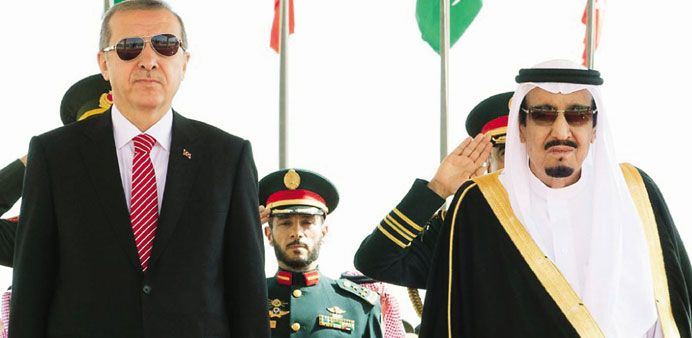Saudi King Salman bin Abdulaziz al-Saud stands next to Turkish President Recep Tayyip Erdogan during a welcoming ceremony in Riyadh.
AFP/Riyadh
Turkish President Recep Tayyip Erdogan arrived yesterday in Riyadh for a visit at the king’s invitation.
Erdogan’s meeting with King Salman comes a day after Egyptian President Abdel Fattah al-Sisi held talks with the monarch, and precedes a visit by Pakistan’s Prime Minister Nawaz Sharif later this week.
The Turkish and Saudi leaders discussed “means of enhancing bilateral cooperation in various fields, issues of common interest” and external developments, said the official Saudi Press Agency.
Top officials from neighbouring nations Qatar, Kuwait, Jordan and the United Arab Emirates have already visited Salman since mid-February, and other Arab heads of state will follow, said Nawaf Obaid, a visiting fellow at the Belfer Center at Harvard University in the US.
“Saudi Arabia is drastically going to re-energise its foreign policy to bring the kingdom back to its natural role as the main unifier of the Sunni world because of its unique attributes,” Obaid told AFP.
He was referring to the kingdom’s hosting of Islam’s holiest sites, the size of its economy, and its position as the world’s largest oil exporter. “Clearly, things are shaping up in a very different way than they have been in the last several years.”
Salman acceded to the throne in January after the death of King Abdullah, aged about 90.
Erdogan arrived in Riyadh after performing a weekend pilgrimage in the Muslim holy city of Makkah and visiting Madina.
Cairo has accused Turkey of interfering in Egypt’s internal affairs and of supporting the Muslim Brotherhood.
Sisi and Erdogan have had strained relations since Sisi ousted president Mohamed Mursi in 2013, launching a crackdown on his Muslim Brotherhood.
But Obaid said keeping Turkey “on the sidelines” only weakens the Sunni world, which accounts for about 90% of Muslims.
“So as long as you can start having a serious sustained discussion between the major Sunni powers then you can come up with some form of policy at some point down the road, dealing with Iran and dealing with ISIS,” he said, referring to the Islamic State group militants who have seized large parts of Iraq and Syria.
IS has claimed atrocities including the beheading of foreigners and Christians and the burning alive of a caged Jordanian fighter pilot.
An official from nuclear-armed Pakistan confirmed Sharif would make a two-day visit to the kingdom this week for talks.
“Pakistan and Saudi Arabia have been co-ordinating their positions for a long time”, said the official who asked for anonymity.

